Book contents
- Frontmatter
- Contents
- Contributors
- Acknowledgments
- 1 Introduction
- 2 Global Poverty and Unequal Development
- 3 The Karma of Poverty
- 4 Poverty and Morality in Christianity
- 5 Classical Liberalism, Poverty, and Morality
- 6 Confucian Perspectives on Poverty and Morality
- 7 Poverty and Morality
- 8 Hinduism and Poverty
- 9 The Problem of Poverty in Islamic Ethics
- 10 Jewish Perspectives on Poverty
- 11 Liberal Egalitarianism and Poverty
- 12 Marxism and Poverty
- 13 Poverty and Natural Law
- 14 Afterword
- Select Bibliography
- Index
4 - Poverty and Morality in Christianity
Published online by Cambridge University Press: 05 June 2012
- Frontmatter
- Contents
- Contributors
- Acknowledgments
- 1 Introduction
- 2 Global Poverty and Unequal Development
- 3 The Karma of Poverty
- 4 Poverty and Morality in Christianity
- 5 Classical Liberalism, Poverty, and Morality
- 6 Confucian Perspectives on Poverty and Morality
- 7 Poverty and Morality
- 8 Hinduism and Poverty
- 9 The Problem of Poverty in Islamic Ethics
- 10 Jewish Perspectives on Poverty
- 11 Liberal Egalitarianism and Poverty
- 12 Marxism and Poverty
- 13 Poverty and Natural Law
- 14 Afterword
- Select Bibliography
- Index
Summary
Christianity, with Judaism and Islam, is one of three Abrahamic faiths. Its roots and basic presuppositions derive from Judaism. The Jewish scriptures form the first or Old Testament of Christianity. The Old Testament together with the Christian New Testament forms the Christian Bible, the source of Christian revelation. Christianity’s Jewish origin is significant for this study inasmuch as Christian assumptions about anthropology, cosmology, and law are derived from Judaism.
Like Jews, Christians believe that humans are created in “the image and likeness” of God (Gen. 1:27). While Christian philosophers in ages past were fond of speculating on the metaphysical possibilities of this phrase, recent Jewish and Christian scholars recognize that this text does not set forth an ontological theory. Rather, being created in God’s image shows that all human persons are created in such a way that they can relate to other humans, to God, and to the physical world in love, hatred, or indifference.
Keywords
- Type
- Chapter
- Information
- Poverty and MoralityReligious and Secular Perspectives, pp. 62 - 82Publisher: Cambridge University PressPrint publication year: 2010

